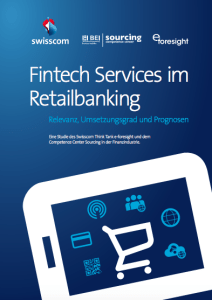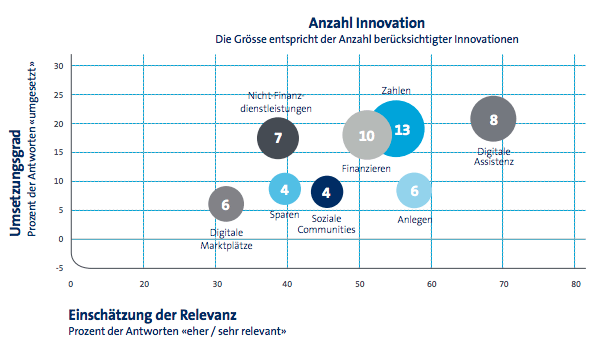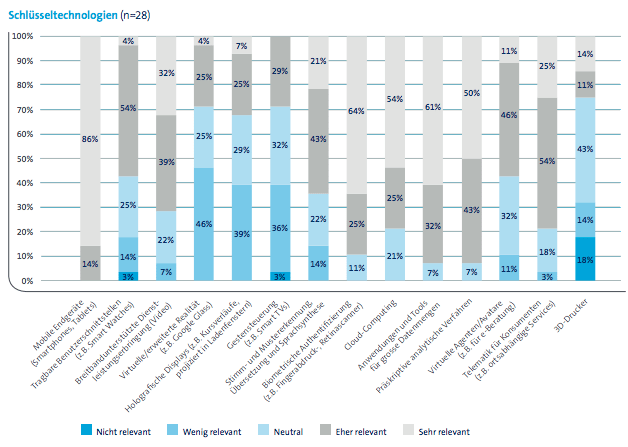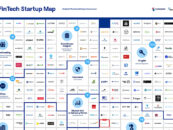
Swisscom Fintech Report: Banks Are Gearing Up For Digital Disruption
by Fintechnews Switzerland October 26, 2016Attracting US$19.1 billion in investment in 2015, fintech firms are growing fast. As customers are increasingly relying on financial services provided by non-traditional providers, banks are gearing up for digital disruption of the industry, according to a new report by Swisscom’s e-foresight and Sourcing Competence Center of the University of St.Gallen and Leipzig.
 Peer-to-peer payment has been a hot topic in Switzerland, notably since the launch of Twint and Paymit. But despite the buzz, volumes of mobile payments remain small, growing at a slow pace.
Peer-to-peer payment has been a hot topic in Switzerland, notably since the launch of Twint and Paymit. But despite the buzz, volumes of mobile payments remain small, growing at a slow pace.
Nevertheless, over 50% of banks believe that mobile contactless payment methods will become popular in the near future. Peer-to-peer services and contactless payments methods will continue to evolve, grow and remain an opportunity for financial services firms, the report says.
92% of respondents said that online onboarding will be crucial for banks in the near future. In March, the Swiss Financial Market Supervisory Authority (FINMA) passed new rulings aimed at reducing obstacles to fintech, among which a circular on video and online customer identification to allow financial intermediaries to onboard clients by means of online and video transmission.
A report by Signicat released in April argued that customers are feeling increasingly unsatisfied with banking onboarding processes which are often considered frustrating and time-consuming. Customers are demanding 100% online processes, the study found.
According to the Swisscom survey results, banks are confident that digital assistance, robo-advisory, payments and financing are the areas that will be the most impacted by fintech solutions.

Qualifying robo-advisors as one of the key innovations in the sector, the report advises banks to identity their target groups for such services and start elaborating a strategy.
Despite Switzerland’s relatively small crowdfunding sector when compared with the likes of the US and the UK, the industry has been growing steadily since 2014. The report cites the launch of crowdfunding platforms by a number of banks as well as the increasing number of collaborations between startups and financial institutions in the areas. It further notes the emergence of innovative solutions such as real estate crowdfunding and predicts notable growth for SME lending and financing.
Banks named the most disruptive technologies in the industry as being mobile terminals, biometric authentication, cloud computing and Big Data.

Earlier this week, the Swiss government announced plans of policy changes to boost competitiveness of the country’s financial industry. Notably, the Swiss Federal Council released a report on a “future-oriented financial market policy” that would allow foreign banks to open in the country. The legal framework is expected to encourage the fintech sector and sustainable investment.
“A stable and competitive financial sector that functions well is a mainstay of the Swiss economy. The Swiss financial centre should continue to assert itself as one of the world’s leading locations for financial business and even be able to strengthen this role,” the Council said as quoted by Out-Law.
The move came a month after Switzerland’s financial regulator FINMA has signed a fintech cooperation agreement with the Monetary Authority of Singapore (MAS).
The agreement aims at providing a framework for fintech companies in Singapore and Switzerland to expedite discussions on introducing new products into each other’s market and understand regulatory requirements.
MAS has signed similar fintech agreements with the Korean Financial Services Commission, the UK financial authority and the government of Andhra Pradesh.
Featured image: Wireless technologies by ESB Professional, via Shutterstock.com.





